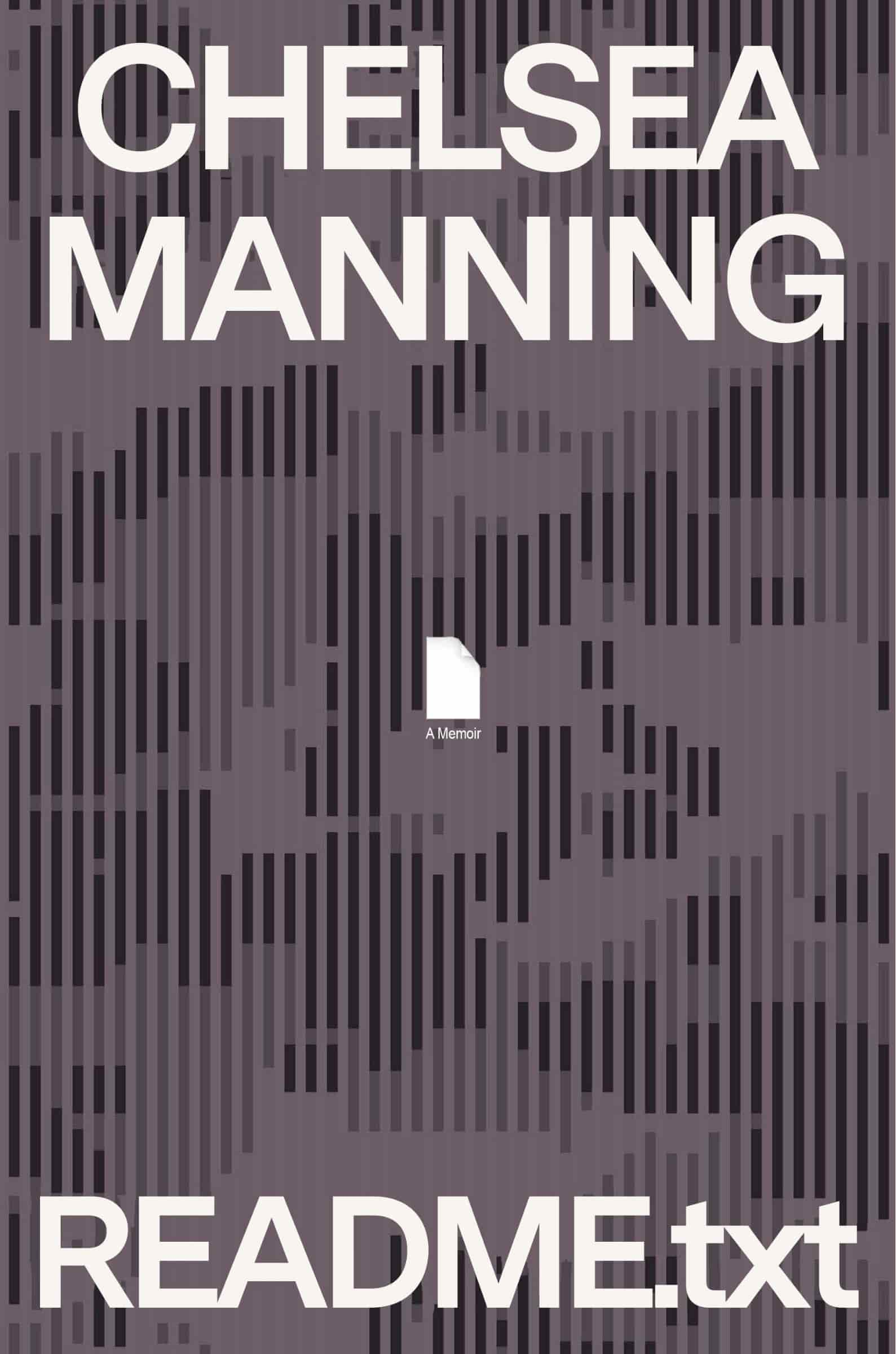“I wasn't thinking about what might happen to me. I was just trying to survive every day. Compartmentalizing is something I was good at. I was grappling with my gender identity and working inside an army that didn't officially allow people like me to serve openly.”
README.txt
In 2010, Chelsea Manning, working as an intelligence analyst in the United States Army in Iraq, disclosed classified military documents that she had smuggled out via the memory card of her digital camera. The army sentenced Manning to thirty-five years in military prison, charging her with twenty-two counts relating to the unauthorized possession and distribution of classified military documents. The day after her conviction, Manning declared her gender identity as a woman and began to transition. In 2017, President Barack Obama commuted her sentence and she was released from prison.
In README.txt, Manning recounts how her pleas for increased institutional transparency and government accountability took place alongside a fight to defend her rights as a trans woman. She reveals her challenging childhood, her struggles as an adolescent, what led her to join the military, and the fierce pride she took in her work. We also learn the details of how and why she made the decision to send classified military documents to WikiLeaks.
Review
An astounding show of courage. This memoir was breathtaking.
Manning begins with her upbringing in Oklahoma, where she lived with her mother, father, and sister.
“Both of my parents were hard drinkers, the kind who drink to escape their daily life. Dad drank cheap beer,” she writes, continuing, “On weekends or holidays, he'd drink so much he could barely stand by early afternoon. Mom drank vodka and rum, with shots of Absolut or Bacardi in every drink. She drank even during her pregnancy with me. She told me she had two miscarriages in the years between Casey's birth and mine. I now wonder how that sadness weighed on her.”
Her parents later divorced, and Manning admits she didn’t notice their struggles. “To me, the family just made sense–it was just the way of the world, like the sun rising in the east and setting in the west.”
“We were special, I had believed, despite our obvious problems. Our family unit was a force of nature. My parents' marriage was special, I'd thought. But not anymore.”
Hearing Manning relay her challenges with her parents, especially her father, was tough to read about. He beat her, “abused everyone close to him.” She never got answers, and when she’d cry from the pain, he wouldn’t stop until she “stopped screaming, stopped showing weakness.”
After graduating with her AS levels in the UK with her mother, Chelsea moved back to Oklahoma and lived with her father and his her wife, who “rarely acknowledged my existence unless I was breaking an arbitrary rule. I was an interloper in the life that they'd built together, a reminder of the marriage he'd had before theirs.”
Eventually, she enlisted in the military, writing, “enlisting would allow me to feel once more that my life had meaning. I wanted to go to Iraq. I wanted to experience the fight firsthand. Be there. Smell it. Even risk my life. If I died in Iraq, I wouldn't die in a way that would embarrass my dad. I also wouldn't die of the targeted violence so many queer people like me fear and experience. Instead, I'd die for equally pointless reasons overseas. I could live with that.”
From this part of README.txt to the leak of the documents, the reader gets a sense of how truly burdensome and exhausting the day-to-day job must have been for Manning, who writes, “My job was to analyze, with emotional detachment, what impact military decisions and personnel movements were having on this giant, bloody "war on terror." But the daily reality of my job was more like life in a trauma ward.”
Not only that, but also Chelsea Manning was serving at a time when she was struggling with her sexuality and gender dysphoria, and her colleagues made a mockery of this. It was also when the Don’t Ask, Don’t Tell Policy was in place, meaning that Manning could serve, but not openly.
“The Admin and I finally had it out. She’d been coercing me to do her bidding for a year at that point, reminding me with every little “faggot” that she had power over me,” writes Manning.
After she made the decision to release the files, and was discovered, Chelsea talks about what exactly happened to her, and the traumatic few months before she was transferred to Fort Leavenworth penitentiary.
“I believed I would be left in the cage forever. I would never see the sky when I wanted to, or see birds, or see my family ever again. I spent all day and all night thinking about regrets, things I hadn't understood were important. I had neglected my relationship with my sister. I have never felt so close to suffocating as I did in that steel cage.”
Eventually, Chelsea Manning was sentenced. To read of her sentencing, and later her time in prison, and how she impacted so many, is deeply moving.
“The decision to bring those files to America and upload them was one decision among many others. I made life-and-death decisions every day. I always had the responsibility of other people's lives in my hands, writes Chelsea,” continuing, “This felt, in some sense, like just another choice, where I was weighing the costs and benefits and deciding that this was the best way to save lives.”
Chelsea Manning's memoir struck a chord with me. I found her to be so courageous. Her fight for her rights as a woman in prison, standing up for herself and others through those haunting days is something I truly admire.
Chelsea Manning is an American activist, whistle-blower, politician, and former United States Army soldier. She lives in Brooklyn and works as a security consultant and expert in data science and machine learning.
README.txt is available for purchase in hardcover or audiobook format. Check IndieBound for a bookseller near you.

